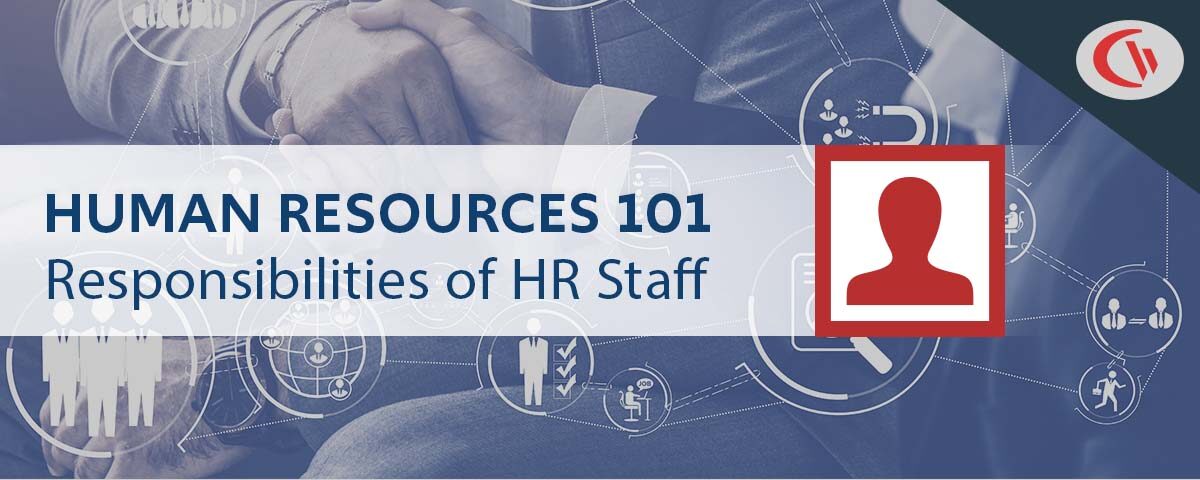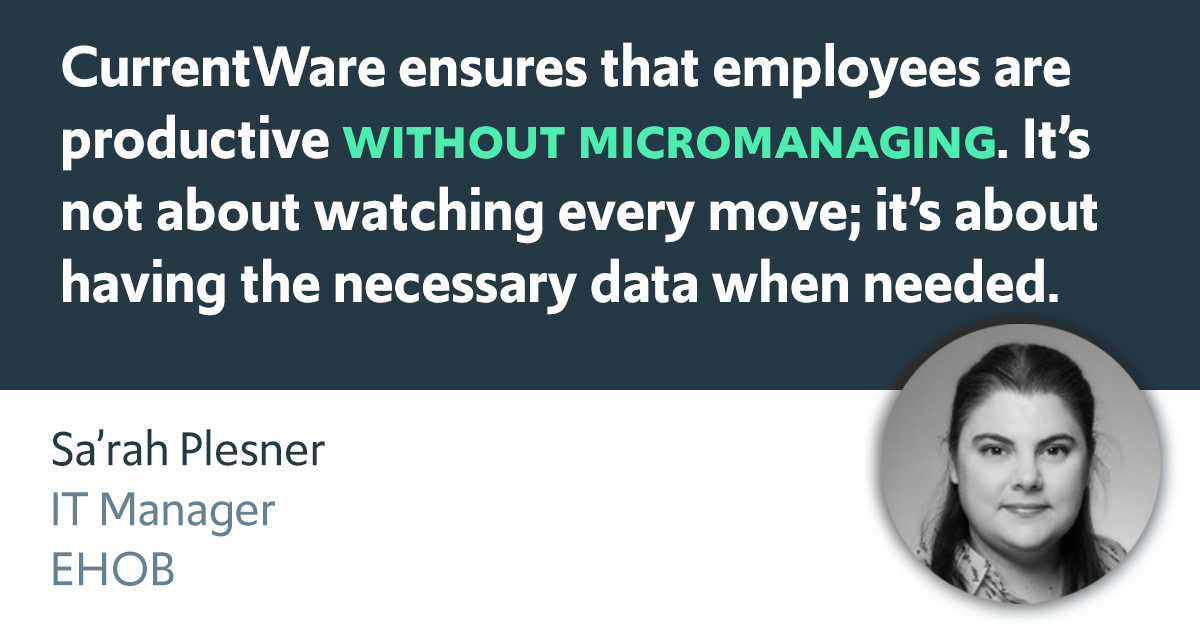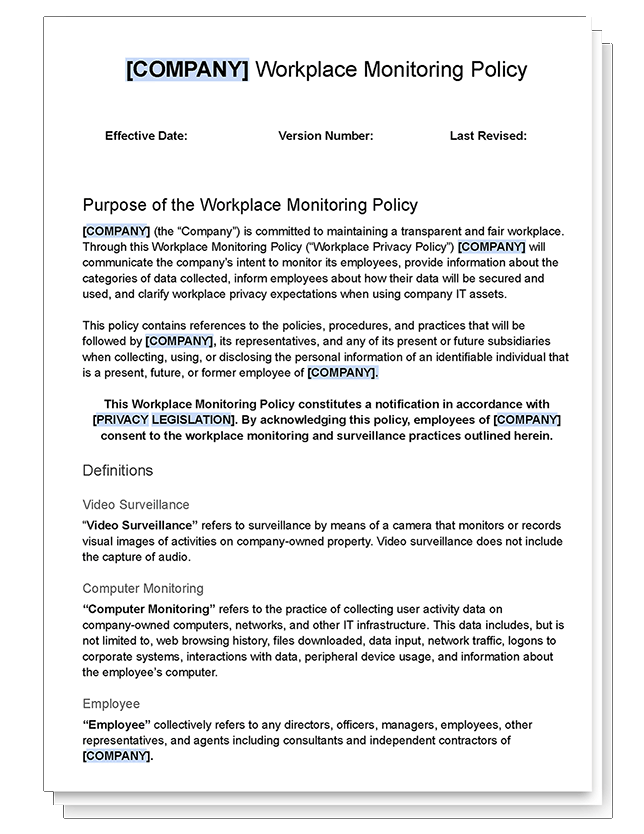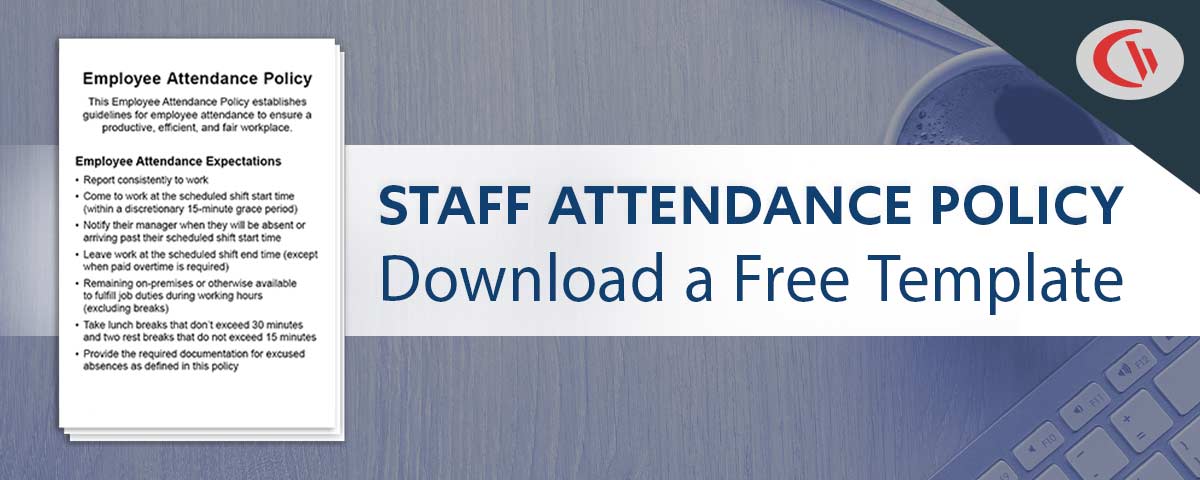10 Key Responsibilities of HR Professionals

HR is the glue that holds companies together. It’s the driving force behind recruiting, onboarding, managing the people side of a business, and ensuring employees are familiar with policies and procedures that apply to themselves and overall operations.
But if the role of HR professionals is still a bit vague, you may need further insight into their key responsibilities. That’s exactly what this article will unpack.
Case Study
From Hunch to Hard Evidence—How CurrentWare Informs HR Investigations

One of the many responsibilities of human resources professionals is to conduct investigations on a wide range of concerns, including harassment, discrimination, theft, misuse of company resources, and potential policy violations.
Ensuring fairness, accuracy, and consistency in the HR investigations process fosters a culture of trust and respect, where everyone feels comfortable reporting issues, knowing they will be taken seriously.
CurrentWare is the digital witness HR pros need to gather proof of employee misconduct. By leveraging CurrentWare’s employee investigations capabilities, they uncover what truly happened in an impartial and objective manner, ensuring a safe working environment for all employees and preventing future incidents.
1) Talent Management
Talent management is the strategic process of hiring the right talent for the company and nurturing them in a way that helps them achieve an optimal level of productivity and performance. All while keeping organizational goals in mind. This process can manifest in a variety of ways:
- Identifying talent gaps in the company
- Onboarding new hires
- Developing necessary skills
- Motivating talent to achieve new goals
Whether you’re building an offshore team or a nearshore team, a good HR manager will help a company source the best talent for the job and ensure they have everything they need to thrive in their careers. In doing so, they’ll boost the performance and credibility of the organization.
Utilizing advanced recruiting software solutions can streamline the entire talent management process. This software offers a comprehensive platform for managing candidate pipelines, automating communication, and organizing the hiring process efficiently. This ensures that HR professionals can focus more on nurturing talent rather than being bogged down by administrative tasks.
2) Employee Management
Similar to talent management, employee management involves making sure employees have everything they need to perform their jobs well. However, employee management focuses more on the person as a whole, rather than just their job output.
As an HR professional, part of the job is to provide support, resources, and feedback for employees. This includes answering questions or concerns regarding company culture, job expectations, performance, and more.
One of the best ways for HR to manage employee behavior is to use employee monitoring software. Using monitoring programs that track everything from browser activity to productivity, HR can effectively keep tabs on employee growth and compliance.
3) Performance Management
A healthy, profitable business needs high performing employees. And that’s what many HR professionals are tasked with overseeing.
HR managers can conduct performance reviews and give performance feedback. Plus, they can make recommendations to other managers about which tasks or responsibilities are best suited to an employee’s capabilities. This ensures a consistent and balanced overall performance rate.
An HR manager may also be tasked with administering hearings for underperforming employees and presenting high performing employees with recognition or reward.
4) Implementation Of Policies And Procedures
Every business has its own policies, procedures, and code of conduct to ensure operations run smoothly, legally, and comfortably for everyone at the office. Part of HR’s responsibility is to not only implement these workplace procedures but also to make sure everyone recognizes and understands them.
An employee handbook helps make this process smoother by providing employees with a clear and accessible guide to company policies and expectations. It ensures consistency and reduces confusion, allowing employees to better understand their responsibilities and comply with workplace procedures. This clarity fosters a more organized and harmonious work environment.

Workplace Monitoring Policy Template
- Disclose your company’s intent to monitor employees in the workplace
- Set workplace privacy expectations for employees
- Meet transparency requirements for compliance with privacy laws
Get started today—Download the FREE template and customize it to fit the needs of your organization.
5) Employee Development
Even the most experienced, high performing employees need access to support and resources for bettering their performance and career trajectory. Providing opportunities for learning new skills and improving existing ones forms part of healthy employee development.
It’s essential for organizations to help employees grow their skill sets and further their career trajectories. This will help to strengthen the business and ensure employees feel driven, engaged, and fulfilled in their job roles.
These career development opportunities may involve business travel. If a corporate travel planner is not available the HR team may play a part in business travel planning. In these cases, HR professionals may be responsible for managing booking flights and hotels to ensuring compliance with travel policies and procedures. They will also ensure that employees are safe, productive, and compliant when traveling for work.
6) Employee Training
Employee training programs are a crucial aspect of any business these days, and HR professionals are typically the ones to organize and implement them. Some of the training programs an HR professional might implement include:
- Onboarding training
- Compliance training
- Teamwork training
- Technology training
- Soft skills training
Employee training can be implemented in person. Or, they may take the form of software program sessions monitored by a supervisor or manager. HR can also provide training for employee-related marketing campaigns, such as an employee advocacy program—all of which can get monitored by high quality HR management software.
7) Payroll, Benefits, and Compensation Management
Compensation management refers to the process of determining an employee’s appropriate salary and benefits, such as health insurance, paid leave, or retirement.
Employees often have different benefits packages. This means someone needs to help assess each individual employee when the need arises—and that’s what an HR manager does.
If an employee falls pregnant, gets sick, or decides to retire, HR professionals will perform an audit to make sure everyone gets the benefits they’re entitled to.
The HR department plays a key role in payroll management in many companies. They are responsible for maintaining employee records, overseeing timekeeping and attendance, determining benefits and deductions, and ensuring compliance with labor laws. HR will use tools like payroll software to ensure timely and compliant payroll processing.
8) Expense Management
Another financial area that human resources professionals may assist with is the management of expense reports. This includes duties such as reviewing employee submissions for accuracy, ensuring compliance with company policies, and facilitating the reimbursement process in a timely manner.
HR and accounting departments collaborate closely on expense report management to ensure the process is accurate, compliant, and efficient. HR typically establishes clear policies for allowable expenses, limits, and submission timelines, with input from accounting to align these policies with financial controls and tax regulations. HR also educates employees about the expense reporting process, while accounting provides technical support for expense systems and addresses financial-related queries.
When employees submit expense reports, HR typically conducts an initial review to ensure compliance with company policies before forwarding them to accounting for further verification. The accounting team audits the reports to verify accuracy, prevent fraud, and ensure compliance with tax laws, while HR addresses any discrepancies or policy violations. Accounting then processes reimbursements and records expenses, while HR tracks spending trends to inform future policy updates.
Together, both departments may implement expense management software to streamline the process, improving visibility and efficiency across the organization.
9) Legal Compliance
Every business must abide by general laws and policies, and HR is responsible for ensuring they’re adhered to. Staff in the HR department are also responsible for building and implementing company policies in a way that employees can easily understand and conform to.
In the instance of HR needing to conduct an investigation on policy violations or employee misconduct such as stealing company resources, misuse of time, etc., employee monitoring software and employee management software are a game changer.
Through these systems, HR professionals can gain insights into employee computer activity and employee history, such as security compliance and performance records. The software can also identify if an employee is an insider threat or poses a risk to data security.
10) Staffing Audits
Staff audits are the first step HR managers take towards assessing labor issues in the workplace. There are a number of reasons why performing staffing audits are essential for any functioning enterprise.
- Bringing employee records up to date
- Developing a clear system for early retirement and severance options
- Filling in critical personnel data gaps
- Improving subsequent workplace analysis
- Assessing time tracking, scheduling and work hours
- Establishing effective record-keeping procedures
Staffing audits typically involve assessing a wide variety of organizational data. Employer records, work schedules and time sheets, benefits information and personnel behavior can all come under scrutiny. This can help to pinpoint issues and improve the productivity, efficiency, accuracy, and legal compliance of a company’s staffing body.
#11 BONUS ENTRY—Risk Management
a major component of typical HR responsibility includes risk management. Such risks relate to the rate at which a company hires, retains, manages, and lets go of employees. Additionally, they relate to the regulation of employee behavior and compliance procedures.
HR risk management focuses on predicting likely outcomes. This allows them to mitigate precarious situations and prevent unwanted problems from occurring.
Conclusion
While the exact roles and functions of an HR professional may vary from company to company, these ten responsibilities cover all the basics of what makes HR professionals so integral to a healthy organization.
From recruitment to performance management to retirement and everything in between, HR makes sure that the humans behind the business have their needs met and their behavior in check.
With the support of employee monitoring software, HR professionals can approach their responsibilities with even more accuracy, efficiency, and ease. Not only will this improve overall operations, but it will also make life in the office better for everyone.
Article by the MSP Zheng



